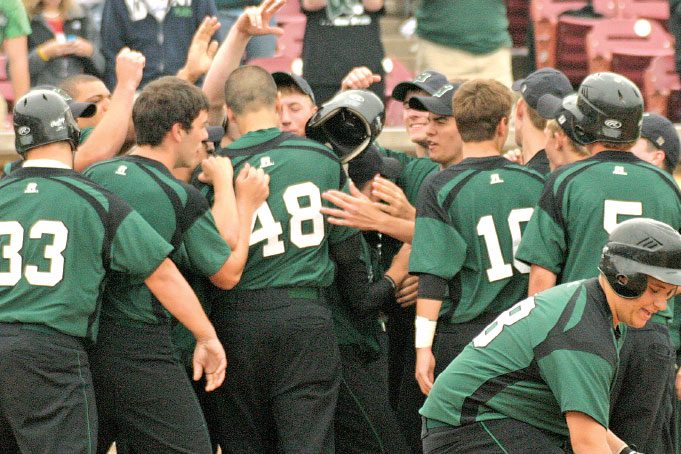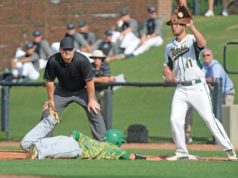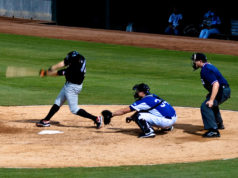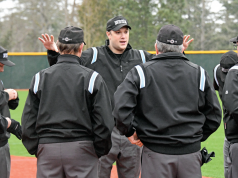A walk-off is a run-scoring event in the bottom half of the last inning of the game that gives the home team the win. That may include not only a home run, but any base hit, a bases-loaded walk or hit batter, a sacrifice fly and events not involving the batter such as steals of home, passed balls, wild pitches, errors, balks and even interference.
Walk-offs result in joy for the home team, dismay for the visitors and sometimes a challenge for the umpires.
On occasion other things besides the walk-off act need to happen for the game to be over. An incident in a Georgia high school semifinal playoff game proved just that. Except where noted, the material applies equally to NFHS, NCAA and pro rules.
In the May 18, 2017, game, the score was tied with two outs in the bottom of the seventh inning. A Johns Creek batter drew a walk, seemingly forcing in the winning run for a 4-3 victory over Lee County. Before the umpires left the field, the Lee County coach appealed that the runner from second never touched third. The appeal was acknowledged by the third-base umpire and the runner called out, sending the game to extra innings. Lee County prevailed with two runs in the top of the eighth. That victory was ultimately overturned on appeal by the governing board because the umpires had used cell phones to consult the state rules interpreter regarding the applicable rule. The full story is in the 10/17 issue of Referee.
The umpires correctly applied the NFHS rule. On a walk-off base on balls, each runner must advance and touch the next base or be subject to be called out on appeal. If that out becomes the third out, a run cannot score because of the force play including one made by appeal (NFHS 9-1-1 Exc. b; NCAA 5-6c Exc. 2; pro 5.08a Exc. 2). The fact that the runner touches the plate before the out is declared is not a factor.
Other events which can preclude a run from scoring are the failure of the batter-runner to touch first base, or a preceding runner who is declared out on an appeal of a baserunning infraction. Although it was not a factor in the Georgia situation, it is possible for a time play to be involved in a game-ending appeal. When a preceding runner is appealed for a baserunning infraction, the out is considered to have occurred at the time of the infraction. Thus when two are out, the status of a following runner is affected by a preceding runner’s failure to touch or retouch a base and a run cannot be scored (NFHS 9-1-1 Exc. c; NCAA 5-6c Exc. 3, 8-1d; pro 5.08a Exc. 3).
The requirements for touching the next base on a walk-off base on balls are different in NCAA and pro, where only the batter-runner and the runner on third are required to advance (NFHS 9-1-1 Nt 2; NCAA 5-8d Nt; pro 5.08b).
The routine “statute of limitations” for appeal plays is before the next pitch or any play or attempted play. In NFHS and NCAA, if the offensive team initiates the play, the appeal is not negated, but in pro an appeal cannot be made if either team initiates a play (NFHS 8-2 Pen.; NCAA 8-6b4; pro 5.09c4).
For an infraction that occurred during a play that ends a half-inning, the appeal must be made before the pitcher and all infielders leave fair territory and not merely before the next pitch, etc., as in NFHS. NCAA further specifies the catcher must have left his position on his way to the bench (NFHS 8-2-5 Pen.; NCAA 8-6b8; pro 5.09c4).
If the appeal is to be made after the game has apparently ended, the end-of-half-inning procedure applies for NCAA and pro games, but in NFHS the appeal must be made before all umpires leave the field (8-2-6j). In the Georgia game, the time of the appeal was not an issue because all four umpires were still on the field when the Lee County coach approached the plate umpire. Additionally, whether the runner on second ever got to third was not argued. At some point, such a runner can be judged to have abandoned his effort to reach the next base and be declared out. Simply leaving the baseline is likely insufficient to call an out, but crossing a foul line or entering a dugout or a celebration would certainly qualify (NFHS 8-4-2p Nt; NCAA 8-5c; pro 5.09b2 Cmt). Here’s an actual play from another prep game.
Play 1: With R1 on first, R2 on second and one out, B5 strikes out. The scoreboard operator quickly turns on the light for the second out. R2 glances at the scoreboard, sees two outs and trots off to the first-base dugout thinking B5’s strikeout was the third out.
Ruling 1: The base umpire waited for R2 to approach his dugout and take off his helmet before calling the out. The umpire would have been justified in calling the out sooner once it was clear R2 had abandoned his base — definitely when he crossed the foul line and probably by the time he reached the pitcher’s mound.
Abandonment is not an appeal play. It’s possible for a walk-off home run to be negated by a runner’s abandonment.
Play 2: With R1 on first and two out in the bottom of the last inning of a tie game, the batter hits the ball out of the park. R1 touches second and believing the home run automatically wins the game, cuts across the diamond and heads toward his bench as the batter-runner touches all the bases. Ruling 2: Once R1 is called out for abandonment, the inning ends and the home run does not count.
Game-ending appeals are most likely to be for baserunning infractions. In addition to missing a base, or failing to properly retouch a base (leaving too soon), failing to touch home immediately after over-running/over-sliding qualifies. In NCAA and pro, a runner who takes a running start on a tag up must also be appealed, but in NFHS, such a runner is immediately declared out (8-4-2o).
There are other types of infractions that could be appealed, including the use of an illegal bat or glove, batting out of order and an illegal substitute.
What's Your Call? Leave a Comment:
Note: This article is archival in nature. Rules, interpretations, mechanics, philosophies and other information may or may not be correct for the current year.
This article is the copyright of ©Referee Enterprises, Inc., and may not be republished in whole or in part online, in print or in any capacity without expressed written permission from Referee. The article is made available for educational use by individuals.


















